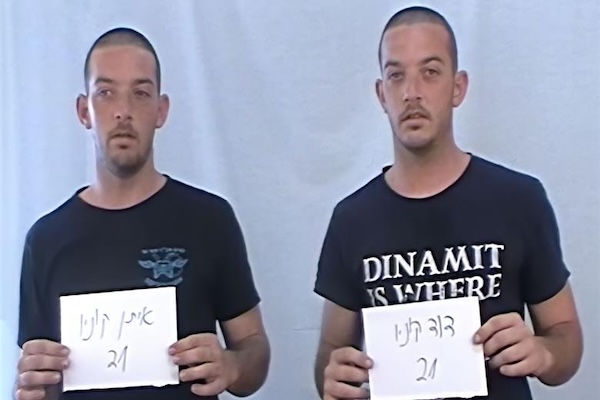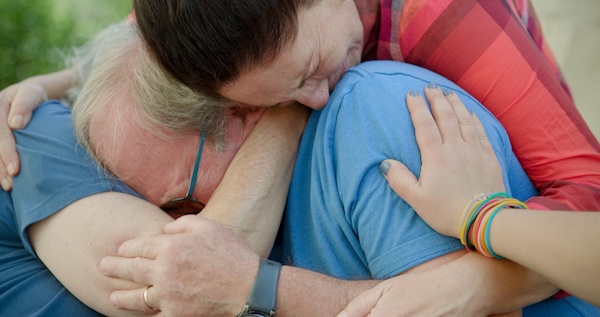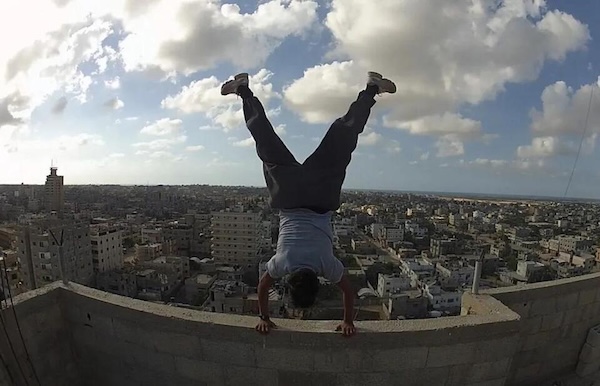Film Reviews: At the Berlin Film Festival — Hostage Heartbreak and Arab Acrobatics
By David D’Arcy
Two heartfelt documentaries about the Hamas attack and hostage-taking have premiered at this year’s Berlinale and have been received respectfully, even welcomed.

David and Eitan Cunio at their audition for Tom Shoval’s film Youth, from the documentary, Letter to David. Photo: Orit Azoulay
The Berlin International Film Festival (Berlinale) used to be a place where Israeli films were premiered and bought and sold to territories around the world every February. Films about and by Palestinians were also part of the Berlinale’s mix. No Other Land (2024), a Palestinian-Israeli collaboration that is now a finalist for the documentary Oscar, premiered in Berlin last year.
After the October 7, 2023 attacks on Israel and the war in Gaza that followed, Israeli films disappeared (mostly) from Berlin. Last year, when a new film by the Paris-based Israeli director Amos Gitai made its debut, protesters calling for a ceasefire interrupted the screening.
Now two heartfelt documentaries about the Hamas attack and hostage-taking have premiered at the festival and been received respectfully, even welcomed. One of them, Holding Liat, won the Berlinale’s Documentary Film Award.
Letter to David, directed by Tom Shoval, revisits the October 7 siege of Kibbutz Nir Oz near Gaza, where 46 people were killed in the attacks and 71 were taken hostage. The kibbutz was home to the Cunio family of Israeli Jews originally from Argentina. David Cunio was captured and is still being held by Hamas, who also have his brother Ariel, the Israeli military says.
There’s more. David Cunio is a twin. His twin brother, Eitan, was also on the kibbutz on October 7, and almost burned to death in a safe house where he hid as attackers set buildings afire. Shoval, a film critic turned filmmaker, met David and Eitan when he cast them in Youth (2013), his debut film about twins who kidnap a classmate and then demand a ransom that might get their struggling family out of debt. If this narrative interplay of kidnappers and hostages weren’t enough, Youth premiered, featuring the Cunio twins, at the 2013 Berlinale in 2013. Screening Letter to David at the festival this year was something of a homecoming, or a wish for one.
Letter to David scrutinizes David’s life and closeness to his family from the boy’s childhood to what the family hopes will be a humane end to his abduction. His close bond with brother Eitan (along with Shoval’s affection for the family) is at the core of the documentary, which unfolds via a collage of visual memories, most of them far from mournful. The clips include a hilarious series of Israeli twins who auditioned when Shoval was casting Youth. After that film, David Cunio considered a career in acting — if he could work with his twin brother. Shoval counseled him that the entertainment business offered few such opportunities, so David became an electrician.
Letter to David can feel like a home movie, but that’s the point. Most of the Cunio family members live near each other, and that gives the film a powerful sense of belonging, longing, and a foreboding of loss. Underneath that uneasiness is the gnawing grievance that the Israeli government failed to protect its own citizens.

A scene from Holding Liat. Photo: Berlinale
Holding Liat, directed by Brandon Kramer and executive produced by (among many others) the filmmaker Darren Aronofsky, supplied an Israeli-American perspective.The film tracks the abduction and eventual release of Liat Beinin Atzili, the daughter of an American couple in Israel who throughout the ordeal held onto their progressive politics. Yehuda Beinin, Liat’s father, even has a “Bernie” bumper sticker on his car. The film confronts a tangle of emotions after the attack — the horror of a daughter and her husband who are taken hostage while 30 people on their kibbutz are murdered, the anguish of the vengeful war triggered by the October 7 Hamas massacres, and the grueling, uncertain strategy of relying on the Netanyahu government to get Liat and the other hostages back.
The family’s plea for help involves a journey to Washington D.C. with other hostage families, along with a grandson who barely survived and now wants who wants the Hamas attackers killed. The trip offers family members chances to speak to American politicians in plain English. Joe Manchin, Mitch McConnell ,and Ron Wyden nod in agreement hearing their frustrations. Did any of those politicians attempt to pressure Netanyahu toward a cease-fire or an accelerated engagement toward freeing hostages? Not that we can see.
We do see Mr. Beinin boil over in his frustration with Israeli politics, erupting on camera, though restraining himself with US politicians and interacting gingerly with a compassionate Palestinian-American. Liat is among the hostages released, a huge relief for her family, although her husband is confirmed dead. A weary Yehuda Beinin demands justice for both sides. The film’s Berlin premiere was overtaken by traumatic events. One coffin returned to Israel by Hamas turned out not to contain the body of a young mother who lost two children. And Trump called for the mass displacement of Arabs from Gaza and the rebuilding of the emptied seaside for tourism. No word so far on when and where Holding Liat might be seen in the US.
(These films await to be seen in the US at a moment when an Israeli-Palestinian doc, No Other Land, reviewed at the Berlinale a year ago by this writer, awaits news on whether it will win the documentary Oscar. Please note that reports stating that no US distributors would handle this powerful doc are false. Several distributors wanted the rights and were turned down. Why is the NY Times reporting something different?)

A scene from the documentary Yalla Parkour. Photo: Berlinale
Yalla Parkour, which came close to winning an audience award in Berlin, focuses on a grievance among young Palestinians (pre-Oct. 7, 2023) whom we see on the screen. They can’t travel; they are stuck in Gaza, or at least they seem to be. This debut film by Palestinian-American director Areeb Zuaiter observes young men who engage in parkour gymnastics (military acrobatics), which range from multiple flips on the beach to leaps from buildings and ledges.
Some of these gymnastics are inventive and balletic. Many are also dangerous and crippling, but adolescents who are hurt attempting highly ambitious jumps can earn star status. Bear in mind that all these feats are being accomplished – or crashing – in a confined territory. Think of creatures in a sunny cage. Think of detainees in a prison yard or hamsters on an exercise wheel or grandiose daydreams in three dimensions.
Yet it’s more complicated than that. It turns out that Ahmed Matar, a talented Gaza parkour athlete, actually left Gaza for life in Sweden. We watch him struggling, going through visa hell, to escape the prison of exile and then attempt to re-enter Gaza. Director Zuaiter had a similar problem. Blocked from re-entering Gaza, she needs to find others to film parkour tumblings, which have all the brashness and danger of a YouTube highlight reel. It doesn’t help that the film wrapped before the October 7 massacres, so the Gaza onscreen here looks like a functioning dusty coastal backwater, not the ruin it is today.
Still the visual metaphor holds, if you put some details aside. Life for young Palestinians in Gaza, even before the current war, was crowded and futile for most of those who were trapped there. The acrobatics of parkour – albeit under the radiant sun the US can’t wait to exploit – stand as a pyrrhic dance in an enclosed space. Now that the once-scorned territory may be seized, imagine the future signs on the condo walls – no smoking, no dogs, no parkour.
David D’Arcy lives in New York. For years, he was a programmer for the Haifa International Film Festival in Israel. He writes about art for many publications, including the Art Newspaper. He produced and co-wrote the documentary Portrait of Wally (2012), about the fight over a Nazi-looted painting found at the Museum of Modern Art in Manhattan.
